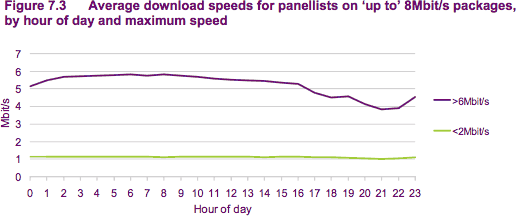Mac Musings
Surprise, Average Broadband Throughput Is Lower than Maximum Throughput
Daniel Knight - 2009.01.08 -
Follow Low End Mac's blogs: LEMblog and Low End Mac Services.
I hate flawed research. It makes me want to scream - or at least write an article debunking the lies.
In the past, I've published Statistical Lies (1999) and Linux Lies (2001). Both articles pointed out a serious flaw in the methodology of WebSide Story that was strongly skewed toward Windows users and away from users of alternate platforms.
One of the earliest subsections on Low End Mac was our No Hype 56k Modem Page, which debunked the myth that people could expect 56 kbps performance from 56k modems. We pointed out that the FCC capped throughput at 53 kbps, and that even that depended on the quality of your phone lines. We also pointed out that top speed is only for incoming data - outbound data could be slower than with 33.6k modems.
Less than Maximum Bandwidth
So I was intrigued to find Deception of 'Up to' Broadband Speeds Exposed on The Register today. The article kept talking about averages, not peak performance. Something just didn't feel right.
The report was produced by Ofcom, "The independent regulator and competition authority for the UK communications industries." And its data collection seems to have been very thorough with over 1,000 users throughout the UK on DSL and other types of broadband.
It's chief finding was that the average throughput was less than the "up to" broadband speed advertised by ISPs - and even the average maximum throughput fell short of the posted top speed.
Well duh!
You only have to think through things to realize this must be the case. We begin with two premises:
- Throughput cannot exceed the "up to" speed.
- Throughput will sometimes be less than the "up to" speed.
Therefore the average total throughput must be less than the "up to" speed. That's basic logic.
How the Internet Works
The Internet is a network of networks, and throughput from Point A to Point B is limited by the slowest network the data must travel through. Further, there is overhead involved in transmitting data - checksums and the like to verify that information has been received accurately; a line theoretically capable of handling 8 Mbps of raw data will in reality transmit less data than the claimed maximum bandwidth.
According to Ofcom, no panelists achieved throughput speeds in excess of 7 Mbps (in recent tests of my Comcast connection, I consistently reached 6.7 Mbps speeds). Because of protocol overhead, achieving 85-90% of "up to" speed isn't bad at all, especially considering that other subscribers are receiving data over the same lines.

Ofcom's chart showing average hour-by-hour throughput.
Unsurprisingly, Ofcom found that throughput was lowest when more people were using the Internet, exactly what you'd expect from a shared resource. The same kind of things happens with cars during rush hour - too much traffic means everyone ends up going slower. In the Ofcom study, average throughput in the morning was close to 6 Mbps, but during late evening hours that dropped to just under 4 Mbps (page 30 of report).
Suspect Numbers
Despite average speeds ranging from almost 6 Mbps to a little less than 4 Mbps, Ofcom reports 3.6 Mbps as the overall average throughput among users of 8 Mbps service.
Yeah, that has me scratching my head too. Unless they've really changed mathematics since I went to school, the average has to be between the highest and lowest values. This is a serious red flag that something is amiss, either in the research or in the published report (perhaps the graph on page 30 shows maximum throughput, not average throughput).
Ofcom claims that the average peak speed among 8 Mbps providers was 4.5 Mbps.
Conclusion
Ofcom concludes that ISPs need to better inform consumers about the difference between real world throughput and maximum theoretical throughput - we couldn't agree more. That said, the sensationalism with which this report has been greeted - El Reg calls it "deception" - only panders to the ill-informed masses, the very consumers likely to read this and think "class action suit".
Clueless people have sued over less.
Join us on Facebook, follow us on Twitter or Google+, or subscribe to our RSS news feed
Dan Knight has been using Macs since 1986, sold Macs for several years, supported them for many more years, and has been publishing Low End Mac since April 1997. If you find Dan's articles helpful, please consider making a donation to his tip jar.
Links for the Day
- Mac of the Day: PowerBook 5300, introduced 1995.08.25. The first PowerPC PowerBook was known for 'flaming' performance.
- Support Low End Mac